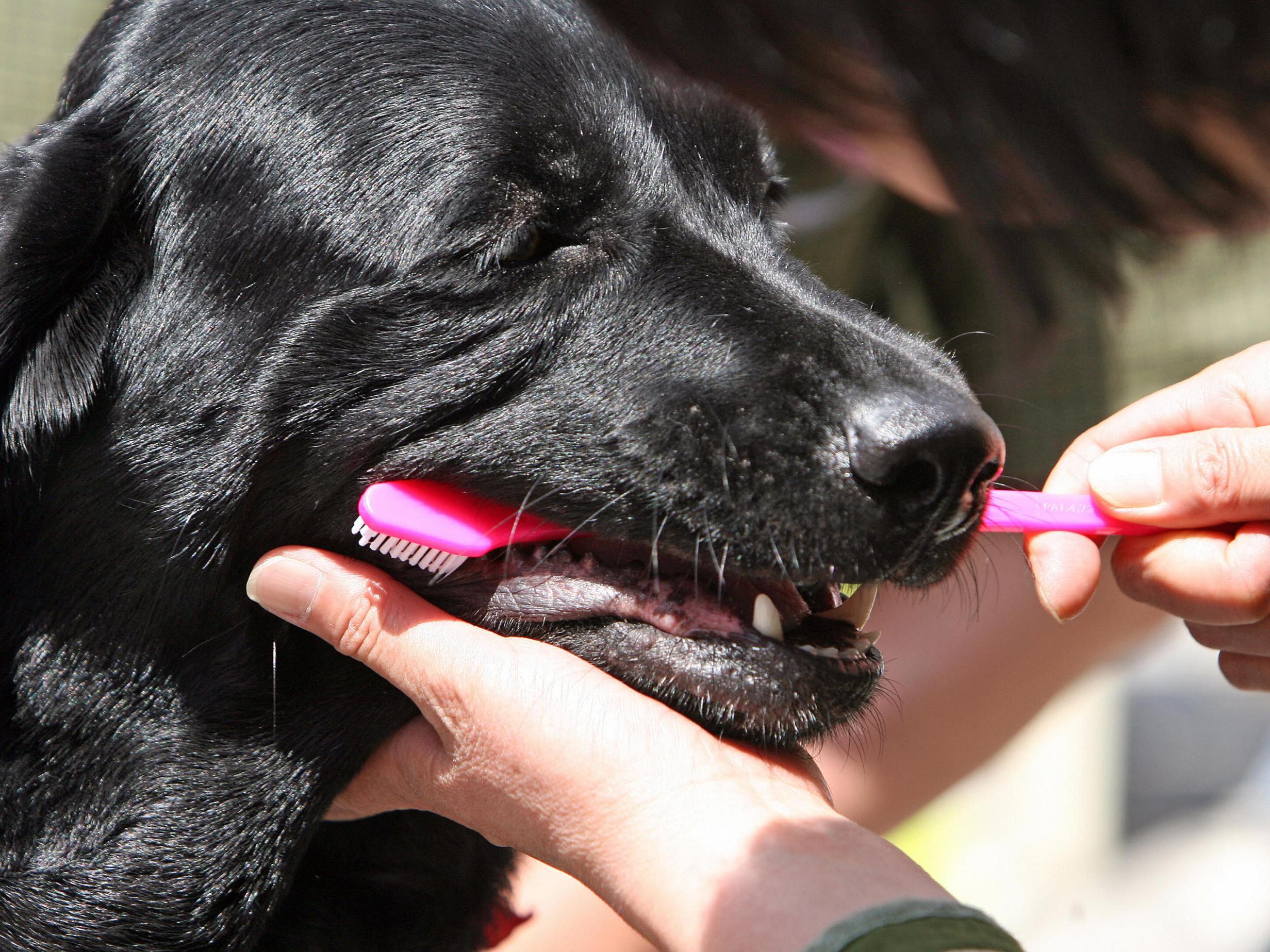From fresh mint to human toothpaste: The different ways owners combat bad breath in dogs
Dental hygiene is the underlying factor affecting bad breath in dogs, claims study

Chewing gum, facial haircuts and brushing teeth with human toothpaste are just some of the bizarre ways owners are trying to stop their dogs having bad breath, according to a study.
Giving dogs snacks that ‘improve’ their breath, handing them fresh mint leaves to chew and keeping the toilet lid closed so stop them drinking the water are other methods used in attempts to neutralise unwanted smells.
The survey of 2,000 dog owners revealed over half believe their dog suffers from bad breath – and yet the same percentage think this whiffy affliction is normal for canines, when it can actually be a symptom of poor dental health.
Only a fifth of those polled would worry about dog breath being a sign of a serious health problem.
However, six in 10 owners admitted to having tried to combat their dog’s bad breath and over half have used a dental chew to do so.
Rodney Zasman, a leading London veterinary surgeon, said: “A lot of dog owners aren’t aware of how important it is to look after their dog’s dental health.
“Poor care of dogs’ dental hygiene can result in implications such as dental plaque, gum disease, tooth abscesses and difficulty eating .
''Bacteria can spread from the teeth and gums causing damage to the kidneys, liver and the heart. Painful and extensive dental surgery and treatment may be needed to cure this.
“It is vital to increase owners’ knowledge of the importance of looking after their dog’s teeth and gums to ensure pets are as healthy and fit as possible.”
While the nation’s dogs have been fed anything from cooked parsley, carrots, apples, mints and breath sprays in a bid to keep them fresh, nearly a third of owners polled didn’t know how often they needed to clean their dog’s teeth.
The survey, commissioned by Lily’s Kitchen pet food via OnePoll.com to coincide with the launch of Woofbrush, their new natural dental chews, found only one in 10 dog owners have ever taken their dog to the vet because of their bad breath.
More owners thought the bad breath of dogs is associated with what their dog has eaten rather than a sign of poor dental hygiene.
Whilst many are familiar with the term ‘bed breath,’ dog owners said their pet’s breath is equally as bad in the evening as it is in the morning, showing that it is an ongoing issue, and therefore requires similar daily care.
Although dogs are often held to be man’s best friend, three in 10 owners admitted to avoiding going near their canine companion because of smell coming from their mouth.
A more confident 40 per cent however will let their dog lick their face regardless of how they smell.
The survey results revealed dog owners have spent on average less than £100 on their dog’s dental hygiene since having them, indicating owners are underestimating the importance of dental health compared to other areas of physical condition.
And they are not making the connection between poor dental health and the implications it can have on their dog’s overall health.
Under half of those dog owners who were polled said they take their dog for an annual dental inspection.
Those owners who do care about their canine’s teeth tended to believe dental chews are an effective solution, with six in 10 using them to combat their dog’s breath.
Commenting on the survey findings, Henrietta Morrison of Lily’s Kitchen, said: “Keeping your dog’s teeth in really good condition is part and parcel of being a responsible pet owner.
''The best time to get your pet used to you brushing their teeth is from when they are puppies.
“Dental disease is so avoidable and when it does happen it can be devastating for the entire health of your pet as bacteria from teeth spreads throughout the immune system, not to mention the added impact of terrible doggy breath.
“As with so many pet products, it’s very hard to work out what’s best for your pet.
''Almost all pet dental chews are made with nasty ingredients including sugar and chemicals.''
TOP 20 WAYS OWNERS ARE COMBATTING DOG BREATH
- Feeding a dental chew
- Brushing their teeth with a special dog toothbrush and paste
- Giving them snacks/treats that 'brush' their teeth/improve their breath
- Giving them a rawhide bone to chew
- Feeding them carrots
- Giving them extra chew toys to remove plaque from teeth
- Taking them to a vet
- Brushing their teeth with a human toothbrush and paste
- Feeding them apples
- Giving them mints
- Mixing fresh mint into their food
- Feed a diet with no added sugar
- Giving them fresh mint leaves to chew
- Keeping the toilet lid closed to keep them out of it
- Cutting down on their meat intake
- Giving them a facial haircut
- Taking them to a dog-dentist
- Feeding them cooked parsley
- Using breath sprays
- Giving them chewing gum
SWNS
Join our commenting forum
Join thought-provoking conversations, follow other Independent readers and see their replies
Comments
Bookmark popover
Removed from bookmarks